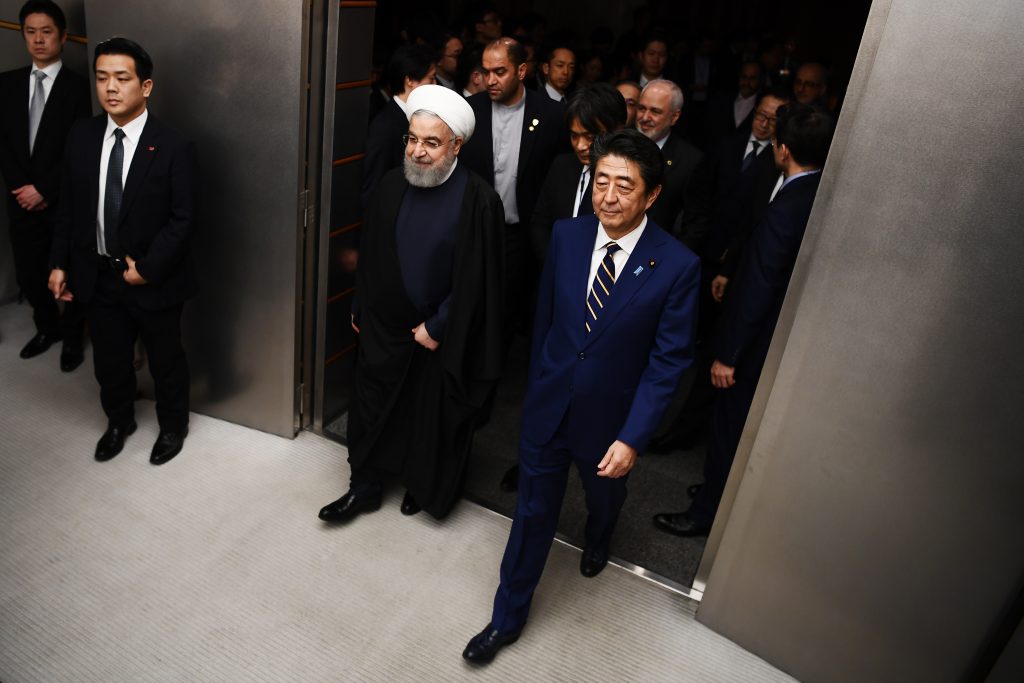
- ARAB NEWS
- 26 Apr 2024

TOKYO: Japanese Prime Minister Shinzo Abe's role as a bridge between the United States and Iran is likely to come under scrutiny, after he held a meeting with Iranian President Hassan Rouhani on Friday, which came at a time when Tehran is increasingly isolated in international society.
The meeting was designed for Abe to call on the Iranian side to refrain from provocation and move for dialogue with the United States so that the tensions between Washington and Tehran will be eased.
But with Iran threatening to take further action early next month over Washington's exit from the historic 2015 nuclear accord, which was signed between Iran and six world powers also including Britain and France, it remains to be seen whether Abe's mediation will pay off, analysts said.
"This year marks the 90th anniversary of Japan-Iran diplomatic relations," Abe told the visiting Iranian president at the start of Friday's meeting, held at the prime minister's office in Tokyo, implicitly asking Tehran not to take fresh action over the US withdrawal from the nuclear pact while highlighting favorable Tokyo-Tehran ties.
The second Japan visit by an Iranian leader since the 1979 Iranian Revolution was hastily arranged at the request of Tehran. During his visit to Japan early this month, Iran's Deputy Foreign Minister Abbas Araghchi asked Japan to cooperate to realize a Rouhani visit to the East Asian nation within this year.
The Japanese side managed to set up a meeting between Abe and Rouhani although the prime minister's schedule has been tight due to jobs related to the year-end, including work to compile a draft government budget for fiscal 2020, which starts next April.
Iran has been reeling under US sanctions. In addition, antigovernment protests believed to be the largest since the Iranian Revolution took place in the country last month. "Iran probably had no choice but to rely on Japan" for help to deal with the situation, an informed source said.
But providing Iran with economic assistance would be an impossible choice for Japan amid Washington's calls for the international community to apply maximum pressure on Tehran.
"It is no use" for Abe to meet with Rouhani, a senior Japanese Foreign Ministry official had said. Many others in the ministry had also been negative about setting up an Abe-Rouhani meeting.
Still, Abe eventually made his own decision to meet with the Iranian president, saying, "Japan, which has maintained an amicable relationship with Iran for a long time, is asked to handle the situation in a uniquely Japanese way."
An official at the secretariat for Japan's National Security Council said: "If the US-Iran tensions develop into a military clash, Japan would be asked for cooperation on the military front by Washington. I believe Prime Minister Abe wants to avoid such a scenario."
To make his meeting with Rouhani as fruitful as possible, Abe put off, by a week from Friday, a cabinet decision on his government's plan to dispatch Self-Defense Forces personnel to the Middle East on a mission to secure sea lane safety in the region, thinking that making the decision on the day of Rouhani's meeting with him would be "disrespectful" to the Iranian president, a senior Japanese government official said.
But it remains unclear if and to what extent Rouhani's Japan visit will improve the situation.
At the start of the Friday meeting, Abe called on Iran to fully abide by the 2015 nuclear accord. In response, however, Rouhani strongly denounced the United States for its withdrawal from the accord, suggesting that it is wrong to criticize Tehran.
There is speculation that Iran may stop accepting nuclear inspections by the International Atomic Energy Agency as the possible further action over the US move.
"Depending on the content of the potential Iranian measure, the situation could change, and Japan may be put in a difficult position," the Foreign Ministry official said.
JIJI Press